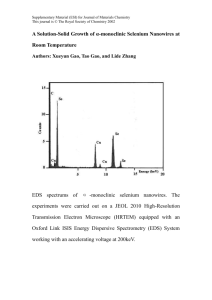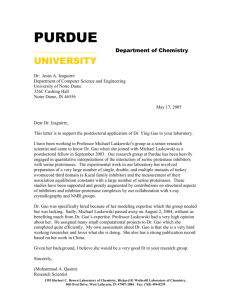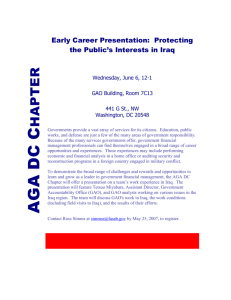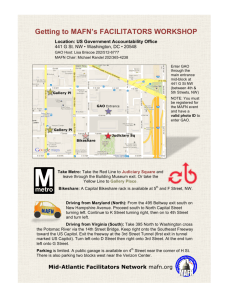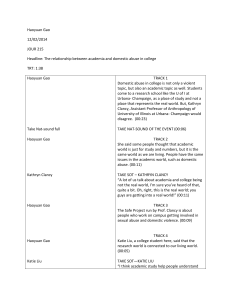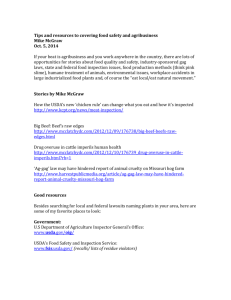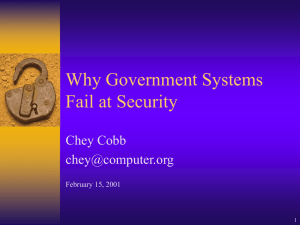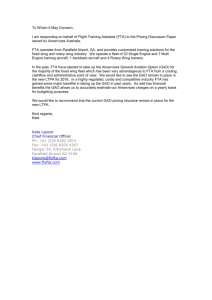July 7, 2003 The Honorable Tom Davis Chairman, Committee on Government Reform
advertisement
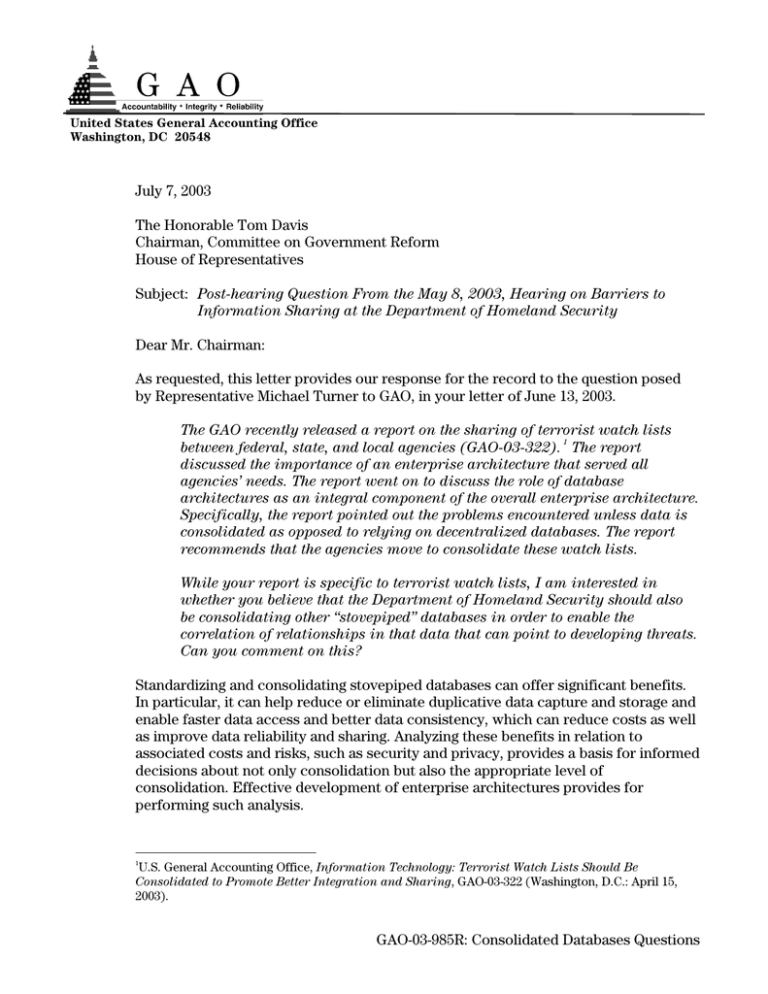
United States General Accounting Office Washington, DC 20548 July 7, 2003 The Honorable Tom Davis Chairman, Committee on Government Reform House of Representatives Subject: Post-hearing Question From the May 8, 2003, Hearing on Barriers to Information Sharing at the Department of Homeland Security Dear Mr. Chairman: As requested, this letter provides our response for the record to the question posed by Representative Michael Turner to GAO, in your letter of June 13, 2003. The GAO recently released a report on the sharing of terrorist watch lists between federal, state, and local agencies (GAO-03-322). 1 The report discussed the importance of an enterprise architecture that served all agencies’ needs. The report went on to discuss the role of database architectures as an integral component of the overall enterprise architecture. Specifically, the report pointed out the problems encountered unless data is consolidated as opposed to relying on decentralized databases. The report recommends that the agencies move to consolidate these watch lists. While your report is specific to terrorist watch lists, I am interested in whether you believe that the Department of Homeland Security should also be consolidating other “stovepiped” databases in order to enable the correlation of relationships in that data that can point to developing threats. Can you comment on this? Standardizing and consolidating stovepiped databases can offer significant benefits. In particular, it can help reduce or eliminate duplicative data capture and storage and enable faster data access and better data consistency, which can reduce costs as well as improve data reliability and sharing. Analyzing these benefits in relation to associated costs and risks, such as security and privacy, provides a basis for informed decisions about not only consolidation but also the appropriate level of consolidation. Effective development of enterprise architectures provides for performing such analysis. 1 U.S. General Accounting Office, Information Technology: Terrorist Watch Lists Should Be Consolidated to Promote Better Integration and Sharing, GAO-03-322 (Washington, D.C.: April 15, 2003). GAO-03-985R: Consolidated Databases Questions In the case of federal watch lists, we identified indicators (such as the number and variability of the lists and the commonality of their purposes) of opportunities to consolidate and standardize. Consequently, we recommended that the Department of Homeland Security determine the extent of watch list consolidation needed to accomplish its mission and that such consolidation be done as part of the department’s efforts to develop an enterprise architecture. We believe this approach—analyzing information and data needs and solutions within the context of an enterprise architecture—is also necessary to determine the extent to which all existing systems of the department’s 22 component agencies should be standardized and consolidated. In fact, during the subject hearing, the department’s chief information officer testified that it plans to develop and use an enterprise architecture to guide its systems consolidation and integration. He stated that the department plans to issue the enterprise architecture by the fall of 2003. If you have any questions concerning this information, please contact me at (202) 512-3439 or hiter@gao.gov, or Gary Mountjoy, Assistant Director, at (202) 512-6367 or mountjoyg@gao.gov. Sincerely yours, Randolph C. Hite Director, Information Technology Architecture and Systems Issues (310264) Page 2 GAO-03-985R: Consolidated Databases Questions This is a work of the U.S. government and is not subject to copyright protection in the United States. It may be reproduced and distributed in its entirety without further permission from GAO. However, because this work may contain copyrighted images or other material, permission from the copyright holder may be necessary if you wish to reproduce this material separately. GAO’s Mission The General Accounting Office, the audit, evaluation and investigative arm of Congress, exists to support Congress in meeting its constitutional responsibilities and to help improve the performance and accountability of the federal government for the American people. GAO examines the use of public funds; evaluates federal programs and policies; and provides analyses, recommendations, and other assistance to help Congress make informed oversight, policy, and funding decisions. GAO’s commitment to good government is reflected in its core values of accountability, integrity, and reliability. Obtaining Copies of GAO Reports and Testimony The fastest and easiest way to obtain copies of GAO documents at no cost is through the Internet. GAO’s Web site (www.gao.gov) contains abstracts and fulltext files of current reports and testimony and an expanding archive of older products. The Web site features a search engine to help you locate documents using key words and phrases. You can print these documents in their entirety, including charts and other graphics. Each day, GAO issues a list of newly released reports, testimony, and correspondence. GAO posts this list, known as “Today’s Reports,” on its Web site daily. The list contains links to the full-text document files. To have GAO e-mail this list to you every afternoon, go to www.gao.gov and select “Subscribe to e-mail alerts” under the “Order GAO Products” heading. Order by Mail or Phone The first copy of each printed report is free. Additional copies are $2 each. A check or money order should be made out to the Superintendent of Documents. GAO also accepts VISA and Mastercard. Orders for 100 or more copies mailed to a single address are discounted 25 percent. Orders should be sent to: U.S. General Accounting Office 441 G Street NW, Room LM Washington, D.C. 20548 To order by Phone: Voice: TDD: Fax: (202) 512-6000 (202) 512-2537 (202) 512-6061 To Report Fraud, Waste, and Abuse in Federal Programs Contact: Public Affairs Jeff Nelligan, Managing Director, NelliganJ@gao.gov (202) 512-4800 U.S. General Accounting Office, 441 G Street NW, Room 7149 Washington, D.C. 20548 Web site: www.gao.gov/fraudnet/fraudnet.htm E-mail: fraudnet@gao.gov Automated answering system: (800) 424-5454 or (202) 512-7470
